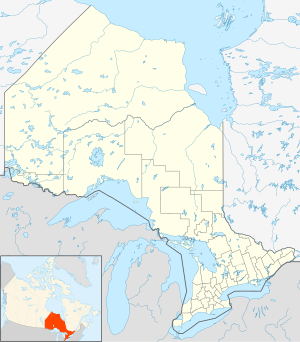Mississauga First Nation
 | |
| People | Ojibwe |
|---|---|
| Treaty | Robinson Huron |
| Headquarters | P.O. Box 1299, Blind River |
| Province | Ontario |
| Land[1] | |
| Main reserve | Mississagi River 8 |
| Land area | 160.75 km2 |
| Population (2024)[1] | |
| On reserve | 389 |
| On other land | 5 |
| Off reserve | 1117 |
| Total population | 1511 |
| Government[1] | |
| Chief | Brent Niganobe |
| Council | Denise Boyer-Payette Jubilant Sky Cada Crystal Dawn Chiblow Chance Counsell Gloria Daybutch Kenneth Macleod Laura Mayer Peyton Pitawanakwat Nancy Whitehead |
| Tribal Council[1] | |
| Anishinabek Nation Mamaweswen, The North Shore Tribal Council | |
| Website | |
| https://www.mississaugi.com/ | |
Mississagi River 8
Misswezahging | |
|---|---|
| Mississagi River Indian Reserve No. 8 | |
 | |
| Coordinates: 46°13′N 83°00′W / 46.217°N 83.000°W | |
| Country | |
| Province | |
| District | Algoma |
| First Nation | Mississauga |
| Area | |
| • Land | 18.41 km2 (7.11 sq mi) |
| Population (2011)[2] | |
• Total | 390 |
| • Density | 21.2/km2 (55/sq mi) |
| Time zone | UTC-5 (EST) |
| • Summer (DST) | UTC-4 (EDT) |
| Website | www.mississaugi.com |
Mississauga First Nation, also spelt Mississaugi, is one of the six First Nations that make up the Mississauga Nations. It is located directly west of Blind River, Ontario, Canada, on the Mississagi River 8 Reserve.[3]
Name
[edit]The word Mississauga is an anglicized version of the Ojibwe word Misswezaagiing, which means ‘a river with many outlets.’ This name comes from the Mississagi River, which is a bird-foot delta, a haven for fish and waterfowl and is currently a jointly managed Provincial Park.
The people of Mississaugi have resided there since time immemorial.

Governance
[edit]The Mississauga First Nation created a Land Code in 2019 governing land use in the community. In 2015, it also adopted the Misswezahging Constitution, which noted that the community had the "inherent right given by the Creator to enact laws necessary in order to protect and preserve Anishinaabe culture, to protect our lands, our language, customs, traditions and practices." Later, in 2019, a Community Protection Law was passed.[4]
In October 2024, the Mississauga First Nation became the first First Nations in Canada to successfully prosecute someone based on its own legal code. A court in Elliot Lake accepted a guilty plea from an individual for trespassing and failing to comply with an order to leave the community. Police had refused to prosecute using the community's legal code, so a lawyer was hired using funds from a government pilot project for private prosecution of Indigenous communities' legal codes.[4]
Notable members
[edit]- Cecil Youngfox (1942–1987), artist
References
[edit]- ^ "Mississauga First Nation - First Nation Detail". Crown-Indigenous Relations and Northern Affairs Canada. Retrieved 19 March 2024.
- ^ a b "Mississagi River 8 census profile". 2011 Census of Population. Statistics Canada. 8 February 2012. Retrieved 3 June 2015.
- ^ "Mississisauga 8", First Nation, Canada Archived July 22, 2010, at the Wayback Machine
- ^ a b Jackson, Kenneth (October 30, 2024). "Trespassing conviction makes history for First Nation law in Ontario". Aboriginal Peoples Television Network. Retrieved October 31, 2024.
External links
[edit]Media related to Mississauga First Nation at Wikimedia Commons
- The Smoke Signal, Mississaugi First Nation News
- "Mississisauga", Indian and Northern Affairs Canada

